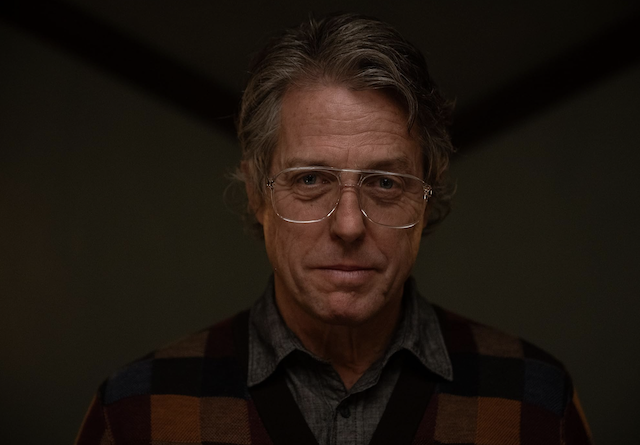
Courtesy of A24
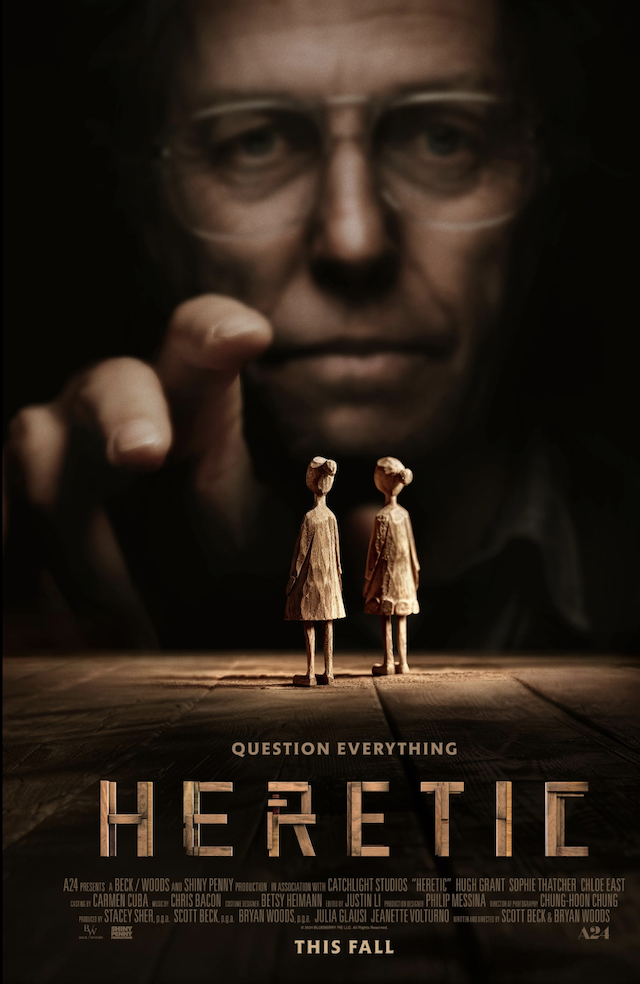
Q: When you were first reading the script, how surprising were the twists and turns and how immediate was your mind of how to play this role?
Hugh Grant: I remember I wanted to turn all the pages. I didn’t have to go make a cup of tea or have a lie down, which is 99 % of the scripts I read. I’ll cut, you know, If you can read it from beginning to end without getting bored, that’s one of the biggest boxes to tick for me. I thought:”This is brave and odd, breaking a lot of rules, a lot of chat, not many different locations, how cool to try that”. And then I thought: “I’m better at talking than I am listening in front of a camera. I might be able to do something with this”.
Q: You’ve been making films together since you were teenagers. How do some of your earliest collaborations subconsciously creep their way into your adult work?
Scott Beck: From a process standpoint, it creeps in because we know whatever we’re going to write, we’re going to find a way to make it. It’s no different than when we were 11 years old and just pooling the resources that we had right in front of us. There was a version of Heretic that we were like, if no one wants to make this like an A24, we’re going to write this script and we’re going to make it in our home state of Iowa. I think that is the mentality we try to apply to all the movies that we can.
Bryan Woods: If we were only allowed to make one more movie, what would it be? And Heretic kept being the answer to that ‘because it is personal and it is talking about something really uncomfortable, what happens when you die, which is an anxiety that Scott and I have had since we were 11 years old making movies in Iowa.
Q: You started writing “Heretic” before “A Quiet Place”. What were the texts and research that helped you unlock the film and how did that improve it when you came back?
Bryan Woods: We looked at a lot of dialogue driven David Mamet’s Oleanna was a touchstone for us because it was this explosive conversation about gender relationships in the classroom, setting and using dialogue to explore those things. The research in terms of our religious education, it was in large part reading holy books that we had never read before, like reading the Book of Mormon, the Quran, Atheist thinkers, people like, you know, Richard Dawkins and Christopher Hitchens, contemporary philosophers.
Scott Beck: It was endless. Meeting people too, sitting down and having several meetings with Mormon missionaries, hearing about their lives and their experiences was really informative as well.
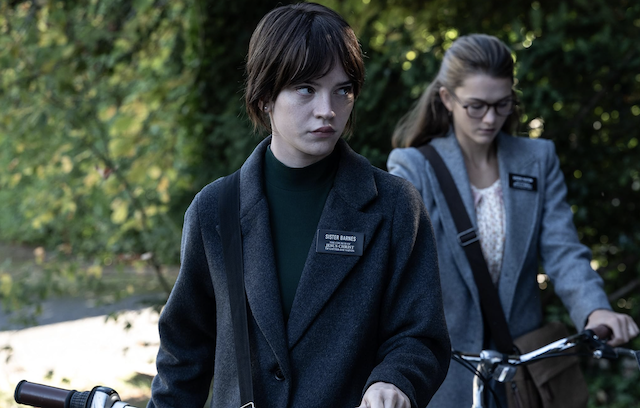
@Courtesy of A24
Q: Mr. Reed forces both the young missionaries and the audience to confront unsettling truths about belief. What did you discover or learn about yourself while exploring these themes through the character?
Hugh Grant: Nothing at all. It’s not like I was religious and then I did this film and suddenly lost my faith. I did find some of the arguments extremely interesting. All that research that Brian and Scott did was worth it. All that stuff about the basic pillars of Christianity being part of many hundreds of religions before Christ ever came along as a savior born on the 25th of December, baptized in the river and all that stuff, that’s fascinating.
Q: How much research into world religion did you do in order to make this film?
Scott Beck: First and foremost, our window into world religion was very personal, meaning both Brian and I happen to be married into families of different religious backgrounds living in LA. It was like a melting pot of our friends ranging from people that practice Islam, to having a friend who’s a Scientologist and on and on. The firsthand experience of being exposed to different worldviews, different traditions happened from a very personal standpoint.
The most important thing for us to go into this project was to approach every aspect of religion, or the idea of being non-religious, with the utmost empathy so that you can deconstruct the movie and see the good in each of those points of views. Certainly religion is a very divisive topic the same way politics is, people are quick to end up on one end or the other making it very binary, and that’s not really what we see when we have these personal relationships with people of different worldviews and different religious backgrounds. Everybody is their own complex human being.
Bryan Woods: The thing that sometimes frightens us the most is the certainty that sometimes comes with religious conversations. This idea of I know what the one true religion is, it’s this and you’re wrong. Or I know that religion absolutely doesn’t exist and I know that when you die, there’s nothing. That kind of certainty is frightening. In any context, like religion, politics, it’s frightening. Hugh Grant loves The Sound of Music, which is a brilliant film. But if Hugh came to us and said, “I know that The Sound of Music is the greatest movie of all time, and you’re wrong if you disagree”, that would be creepy to me. This idea of certainty is definitely something we’re scratching at in the movie.
Q: The film is set in a house of long corridors and dark stairways. How did it make you feel when you were on it?
Hugh Grant: The set is a work of art by Phil Messina. We were lucky to get him. He’s one of the top guys. He created this very clever environment in which, in the first room that they enter, it’s a little weird, but not so weird that we think these are idiots, they should just run away. Then it gradually becomes weirder and weirder and more and more labyrinthine.
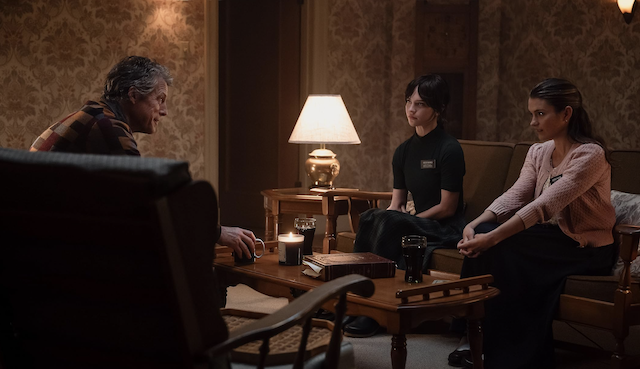
@Courtesy of A24
Q : You are famous for doing a lot of research for your characters: how did it work with Heretic?
Hugh Grant:It’s gotten worse over the years. It’s pretty much standard Stanislavsky stuff, you just keep picking away at the character, building up a biography and more pictures. It has a completely different function for me, which is that it deals with my nerves from which I suffer terribly. We’re two months away from shooting and I’m having my nerve attacks, just doing four or five hours of granular research into the character calms me down.
Q: What is your relationship with religion? Did portraying Mr. Reed makes you reflect on your own views about faith or the stories we choose to believe in life?
Hugh Grant: The history of me in religion is that I was taken to church every Sunday by my parents till I was about 13. Then I said this is too boring and it’s nonsense, and stopped going for many decades and was really quite a devout atheist. But now in my old age and with intense stress with too many children, I sometimes go to the local church in my village in France and sit in there, asking Saint Lawrence to help me out. I can see why the older you get, the more open you are to these possibilities. Especially as to my horror, I now think there is probably another dimension. I don’t want to have another dimension in life. I can’t cope with the one we have.
Q: What drew you to Mormonism as the primary vehicle for this story, in particular, focusing on young women missionaries?
Bryan Woods: About 12 years ago, we made a very small independent film in Utah. I don’t know if we had Mormons before that, like somebody who is part of the LDS church. When we met members of that community, there was just this instant kinship. There was just a connection we felt, not a religious connection, just like with the community at large. It was a fascinating introduction to a uniquely American religion, like it’s a Christ narrative that takes place in America.
That’s odd and funny and interesting. It’s a very young religion, one of the youngest. Therefore the skeptics that live inside our hearts, it was interesting to challenge it because the history is so recent. You can scratch at the religion in a way that you can’t with some of the more ancient religions because there’s no actual history. It’s more stories passed on throughout the years. We found that really fascinating.
Scott Beck: The lens of having two female missionaries was captivating to us for a few reasons. You’re assigned to a certain place that’s new to you, to another person to be your fellow missionary, you’re not immediately bonded outside of just having a shared goal. Taking the female perspective would be the concept of religion over the eons, having this gendered misogyny folded well into the story of Mr. Reed being put against these two female missionaries, looking at the Bible and seeing something as simply as Eve taken from Adam’s rib, the idea of popes always being male, all of the presidents in the LDS church have been elderly men.
Bryan Woods: Even in the Mormon church, men and women have different responsibilities. There’s the priesthood that the men hold, women cannot be part of that. I’m oversimplifying, but there’s almost a feeling of spiritual gifts that men are bestowed and women don’t have. That dichotomy is very present in the LDS church, but also through the history of religion. It just felt like an interesting entry point for this story.
Q: How was your relationship with Sophie and Chloe? Did you try to keep your distance from them, or how did you interact on the set?
Hugh Grant: I never spoke to them. I occasionally lunged towards them with a box cutter. That seemed to keep the atmosphere nice and vibrant. They were wonderful. I only have one real conversation with other actors, it’s the same whoever it is, Meryl Streep or Tom Hanks: “Do you get nervous? I get nervous. Do you get nervous?” And these girls got very nervous, but they pretended they did just to make me feel better. The more I watch this film, the better I realize they are sensational. They’re incredible, and it’s difficult what they had to do, particularly poor Chloe towards the end, when she has to puzzle it all out, giving those speeches while in peril of her life or stabbed.
Bryan Woods: You have a lot of scenes where there’s these long monologues, but it doesn’t feel like a monologue, it feels like a dialogue that’s happening even if it is non verbal. It’s on their faces, it’s in their expressions, their eyes and the way they look at each other and communicate to each other without saying things. It really helps make those scenes work because that’s tricky. It’s crazy hard work that they did.
Q: Do you enjoy games? What is a Hugh Grant game night?
Hugh Grant: – I do love a game. We play a lot of Monopoly in my house, but I have a son who’s so good, even though he’s only 11, he’s so good at cheating that it’s almost pointless to play now. Within half an hour, he’s dominating the whole board. I imagine he’s going to work for Goldman Sachs or something like that. We have to search him, we have to search the lavatory to make sure he hasn’t hidden money in there. I don’t know where he gets it from, he must be on his mother’s side.
Q: Is it more fun to play the villain than the romantic lead?
Hugh Grant: I’ve said this before: I think every actor feels the same way. Romantic leads are very difficult because they’re always tiptoeing on the borderline of boring. The audience is always going to be more drawn to the bad guys. They’re fascinated by them, just like some women are drawn to the bad guy, not the good guy, and no one knows why. I agree that there’s something sinister about the fact that I keep doing it. The common factor is that they’re all raving narcissists. Every time I’m analyzing them, I think: “Well, he’s a narcissist”. This is my seventh narcissist in a row. What’s going on?
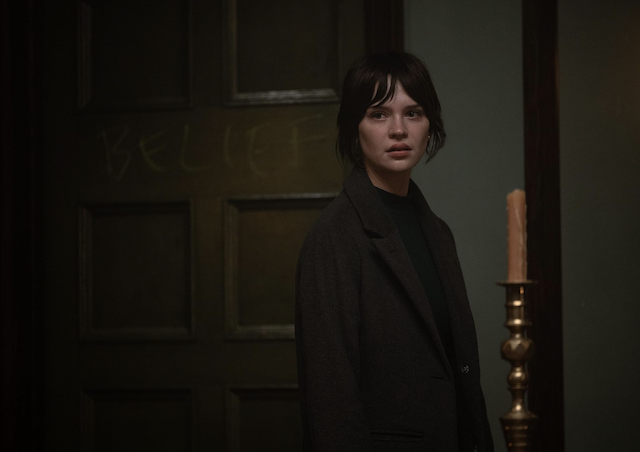
Courtesy of A24
Q: In your writing, you explore the fragility of belief and the tension it creates. What did inspire the story’s unique blend of horror and existential questions? Did writing it challenge your own views on faith or truth?
Scott Beck: – I don’t think it’s necessarily challenging us. I think it’s a reflection of where we’re at in our journey in life, it’s the relationship to the unknowns ever evolving. The search for the answers is what keeps us going and what keeps us interested and hopefully keeps us young. In terms of the inspirations, 15 years ago, Brian and I were scouting locations for the short film in the middle of Iowa, this tiny town, and needed a house with a beautiful white picket fence to shoot in front of. We were going door to door, much like the missionaries in Heretic. We knocked on the door, an elderly couple answered and told us to come in to tell us about the movie.
And we go into this room, not unlike Mr. Reed’s living room, with ornate wallpaper, little trinkets and menageries around the house. These are probably people in their 70s, husband and wife. We’re like: “Oh, it’s a movie that is about a man trying to get to love it his life while an asteroid is coming to destroy the Earth”, they start nodding emphatically and they’re like: “Oh, yes, yeah, that’s gonna be here in a couple of months actually”. And suddenly the tea was something that we didn’t wanna touch, the water was something we didn’t wanna touch, the trinkets, the wallpaper, everything took on this new life or rather death.
Then it felt terrifying to be in this room full of smiles and nodding heads and yet feel like we were trapped. It took them to obviously some severe places and they did not come across as if they were mentally incapable or anything. Like it was as if they were telling us: “It’s 70 degrees outside with a chance of rain later tonight”. That was an impactful moment about our lifelong curiosity about religion, cults, charismatic leaders, how they’re able to curate a following, usually through seemingly normalcy. Heretic is really the culmination of those experiences and curiosities.
Q: Major stars generally stay away from both horror and television, which you are doing both now. How freeing is at this stage in your career to do any genre that you would like to do?
Hugh Grant: It’s very freeing. I like the genre stuff. I’m still a little snobby about television, I don’t really like it. I’ve done a couple of classy HBO ones. Well, one was HBO, one was BBC. But I slightly spit on streaming. I’m with the boys who believe in the collective experience of watching movies, honestly. The idea of everyone sitting alone at home or with a family member or a dog watching a film that’s meant to be enjoyed by hundreds of people, gasping or laughing together, is so sad.
If you like the interview, share your thoughts below!
Check out more Adriano’s articles.
Here’s the trailer of Heretic:

